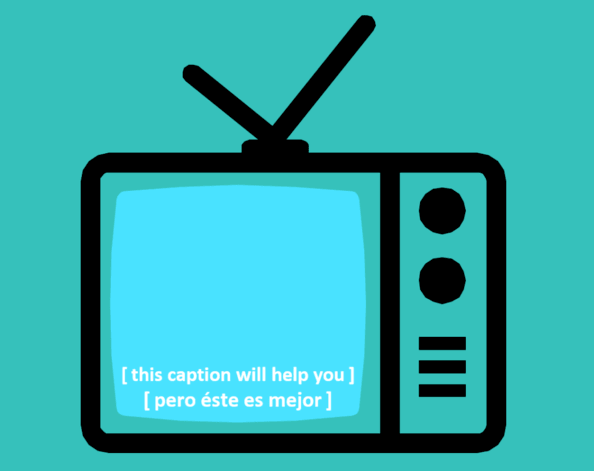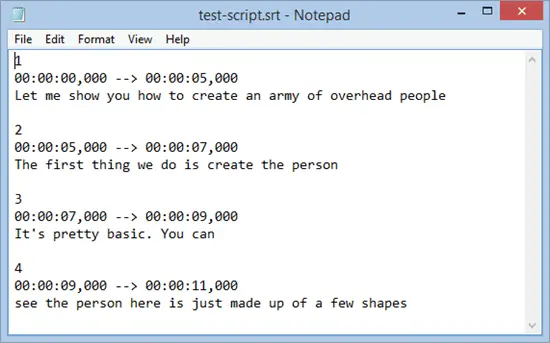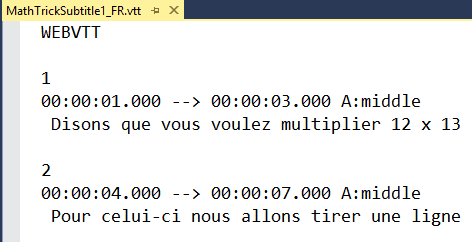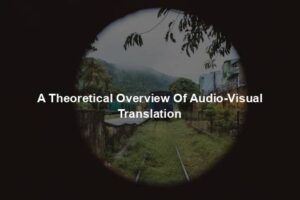
What Is SRT?
SubRip Subtitle files (SRT) are plain-text files that contain subtitle information. They include start and stop times next to the subtitle text, ensuring they’ll be displayed at exactly the right moment in your video. SRT files work on most social media sites that let you upload captions.
- You can create an SRT file in any text editor, including Notepad, TextEdit, and Notepad++.
- Open a text editor of your choice, and order each line of your subtitles, starting with 1.
- Next, put the time the subtitle begins, then “–>”, and the time it ends.
- Format your timestamp like this — “hours:minutes:seconds,milliseconds”.
- Below your start and end timestamp, put your first line of text.
SRT Example
- The most common and basic of all subtitle formats is the SubRip caption format also referred to as the .srt caption format. Most online video sites accept .srt captions including and not limited to YouTube, Vimeo, Wistia etc. Here is an example of a .srt caption file.

What Are The Advantages of SRT Subtitles
SRT Translation Preserves Quality
- SRT translation preserves the video quality due to the translation process. To begin, professional translators establish the correct timing in order to create SRT files, which ensure that the subtitles align seamlessly with the video display. Afterward, the content is then localized. During this process, the subtitle layout is carefully considered, including word length and order, as well as the font choice. This localization allows audiences to view the information in a way that feels customized for them.
- Additionally, SRT translation is becoming increasingly popular with companies who are looking to grow their global online presence because Internet hosting sites like Wistia, Vimeo, and YouTube, allow and even prefer SubRip Text files to other formats. Another important aspect of SRT translations is the fact that subtitles will not interfere with audiences who are utilizing the closed-caption feature on their televisions. As such, viewers can enjoy the quality content without disruption or confusion. Given this feature, companies can also rest assured that their message is being delivered clearly with or without closed captioning.
SRT Translation Broadens Reach
- By incorporating SRT translation, video content becomes accessible to a whole world of viewers. In addition to accommodating audiences who speak different languages, subtitles can also be helpful for individuals with hearing impairments or to enhance the learning process in general by providing a written support that accompanies the screen images and audio recordings. In addition to meeting the needs of audiences, SRT translations also help companies expand their online presence. Search engines like Google and video platforms like YouTube cannot read video content effectively; instead, they rely on the text that accompanies videos to index them. Furthermore, search engines view each language as a separate result, so one video with SRT translations can yield higher keyword rankings and produce more inbound links. By adding these translations to videos, companies can effectively broaden their reach online and around the globe.
SRT Translation Remains Cost-Effective
- The benefits of SRT translations are undeniable, and yet, it remains an incredibly cost-effective option for companies to utilize. SRT translations have a lower overall cost compared to other options due to the minimal multimedia work. Instead of reshooting the video with multilingual actors or dubbing the audio with studio voice-over talents, SRT translations can provide subtitling in multiple languages cost-effectively. Should the content need updating, edits can be made to subtitles much more efficiently than reshooting or dubbing a new video. Another standout aspect of SRT translations are there their on/off capabilities, promoting greater viewer flexibility within a single video. Overall, the SRT translation process prioritizes a company’s money and time as much as it provides accurate and meaningful content to a wide viewership.
What Is WebVTT?
Web Video Text Tracks Format (WebVTT) is a format for displaying timed text tracks (such as subtitles or captions) using the <track> element. The primary purpose of WebVTT files is to add text overlays to a <video>. WebVTT is a text based format, which must be encoded using UTF.
- This format was created in 2010, based on the SRT format. However, WebVTT was designed to be a more robust subtitling and captioning option. The most noteworthy difference between the two is the fact that WebVTT can operate HTML5 code functionalities. As a result, subtitling and captioning done in WebVTT give creators more options when it comes to text format, color, font, and even placement.
- WebVTT files can also contain metadata. Whereas SRT files are for display purposes only, this metadata in WebVTT files can include information about titles, authors, dates, instructions, and other additional content. Because WebVTT is designed with HTML5, this subtitle file type has become very popular with eLearning platforms and courses since they are typically also HTML5-based.
WebVTT Example
- WebVTT captions or .vtt caption format is recommended on Vimeo and for most HTML 5 players. WebVTT captions are similar to .srt captions with only minor differences. The captions has to start with an introductory line – WEBVTT.

You Can Expand Global Reach By Using WebVTT
- Whether it is video for your website or an eLearning course, it is likely that as your company or organization grows, so will your target market audience. Adding WebVTT subtitles is a cost-effective way to share your video content with global audiences. Rather than recreate all of your video content or dub existing content with voice-over recording, WebVTT subtitling will translate your content so that new viewers can understand and relate to it.
- When translation companies perform WebVTT translation, the process provides both cost effectiveness and time savings. If a company intends to have its subtitles translated into multiple languages, source-language subtitle content will be created first. That way, a single subtitle file can be translated into multiple languages at once or over time as the company’s viewership expands.
- Should the video content need to be updated, it is also a much simpler and cost-effective process to update a subtitle file as opposed to either editing a dubbed video or shooting new content. As a result, even when video content is not evergreen, subtitles afford more flexibility.
- Additionally, source-to-source subtitling is also advantageous. In this type of subtitling, the audio language and subtitle language are the same. As with translated subtitles, these subtitles can be permanently displayed or interactive, allowing viewers to turn them on and off. Source-to-source subtitling is often utilized in eLearning courses to differentiate instruction by adding extra support for visual learners. Source-to-source subtitling may also be used by organizations in the healthcare industry to support viewers with hearing impairments.
- WebVTT subtitles of any kind are being used by businesses and organizations looking to improve their ranking online. Since Google and other search engines cannot read images or video content, adding text is an effective strategy to boost Search Engine Optimization (SEO). By adding subtitles to existing video content, your company will rank better online; gain more traffic, page views, and customers due to this increased visibility.
What is the WebVTT translation process?
- Professional translation companies are well aware of the unique challenges that come from adding subtitles. One of the most complex aspects of subtitling is the fact that the text display on the screen needs to mirror what is being heard over audio and watched on the screen. As a result, translators put forth special care when crafting the text, paying attention to both length and word order. By doing so, the subtitle is synchronized with what is being seen and heard.
- This subtitling process can become even more complex when WebVTT translation is needed as opposed to source-to-source translation. In WebVTT translation, the target language may dramatically alter any existing subtitles. That is because the target language may now be a right-to-left language, such as Arabic, or include characters in various other alphabets. With WebVTT translation, the translator can carefully choose not only the proper wording, but the font and the placement that will best help viewers.
- After initial WebVTT translation is finished, the subtitles are synchronized to the video by a team of multimedia experts. That means that the timing between the audio and the subtitle text is accurate. The product then undergoes rounds of quality assurance testing and validation to check for an accurate and authentic message and premium sound and video quality.
Final Thoughts on WebVTT Translation
- Video content is king. Whether you are trying to grow your brand, inspire new learners, or anything else in between, companies and organizations are adding more video content each day. WebVTT translation brings content to life for multilingual audiences while still maintaining an efficiency and cost-effectiveness for businesses. When you are ready to take your video content global, professional WebVTT translation is the right choice.
Major Differences Between Srt And WebVTT Subtitles
Coding of WebVTT Versus .SRT (Difference In Syntax)
- For writers of subtitles, there are some fundamental differences in the way .srt and .vtt files need to be written in order to function properly. Some main differences include commas separating time fractions in .srt files being replaced by full stops in the .vtt format. WebVTT files can be slightly less time consuming for subtitle translators also as frame numbers do not need to be listed and correctly identified. This also can cut down on number of technical errors in the display of subtitles if numbers have been omitted.
Information and References in Subtitles
- If using WebVTT files, non-displayed metadata can be specified and included within the files. This can include titles, authors, instructions, date information and more… In contrast, .srt files are designed to be basic and for display purposes only, where no metadata is able to be stored.
Subtitle and Closed Caption Cue Settings
- Whether you need foreign subtitles, English subtitles or translation of subtitles, in WebVTT subtitles, the writer has the ability to position the cue within the .vtt file. This can be especially useful in cases where there is already writing, other subtitles or information displayed along the bottom section of your video, where the normal positioning of .srt subtitles may obstruct any information displayed there
Subtitle Compatibility
- With extra functional capabilities, (or WebVTT) files are increasingly being used for subtitling purposes, especially for subtitle translation services. Though most browsers and programs are compatible with .vtt, some are not yet fully compatible. As .srt is the more widely used, traditional format, traditional format, you should be able to run .srt files regardless of the programme or browser







